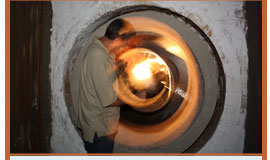 |
 |
 |
Steam Efficiency
Robert Benz, P.E. 11.08
Energy Efficiency in the steam
industry has been long overlooked
and often believed to be impossible.
Engineers have followed the
befief that boilers need to run at
full load 24 hrs a day.
continued
here
Data Aquisition
and Plant Efficiency
Patricia Spiritus,
General Manager 11.08
Data Aquisition is the key to
getting the most out of both your
power plant and your energy dollar
continued
here
Evaluating a Successful
Installation
Marcel Staedter
Clients come to us for a variety of
reasons. Some are looking to lower
their CO2 emissions, some are looking
continued
here |
|
 |
|
History of Steam
When Thomas Savery patented the first crude steam engine in 1679, he had no idea that that his simple mining invention and subsequent work with blacksmith Thomas Newcomen would eventually spark the Industrial Revolution. But it did.
Over the next several hundred years, the steam engine was refined
with many of the most significant ideas coming from James Watt, the
inventor of the modern steam engine. Even then, Watt said improved
efficiency would always be vital to improving the performance of a
steam engine.
While George Herman Babcock and Stephen Wilcox would later add the
boiler, and Charles Parsons would patent the first steam turbine
engine with an electrical generator, Watt’s ideas to improve efficiency remained mostly unchanged. Among them: reduce the dissipation of heat by the cylinder, minimize the loss of heat consequent to cooling the cylinder, and control the loss of power due to the pressure of vapor beneath the piston.
Today, by evaluating existing steam, heat, and power systems, Benz
Air Engineering can make recommendations and retrofit boilers with
technologies and components that were not available decades ago. The
results speak for themselves. Boiler efficiency is increased by more
than 95 percent, operators save millions of dollars in fuel and
energy, and emissions are reduced to the lowest possible level, much
lower than any existing government guidelines.
|
 |
|
 |

















